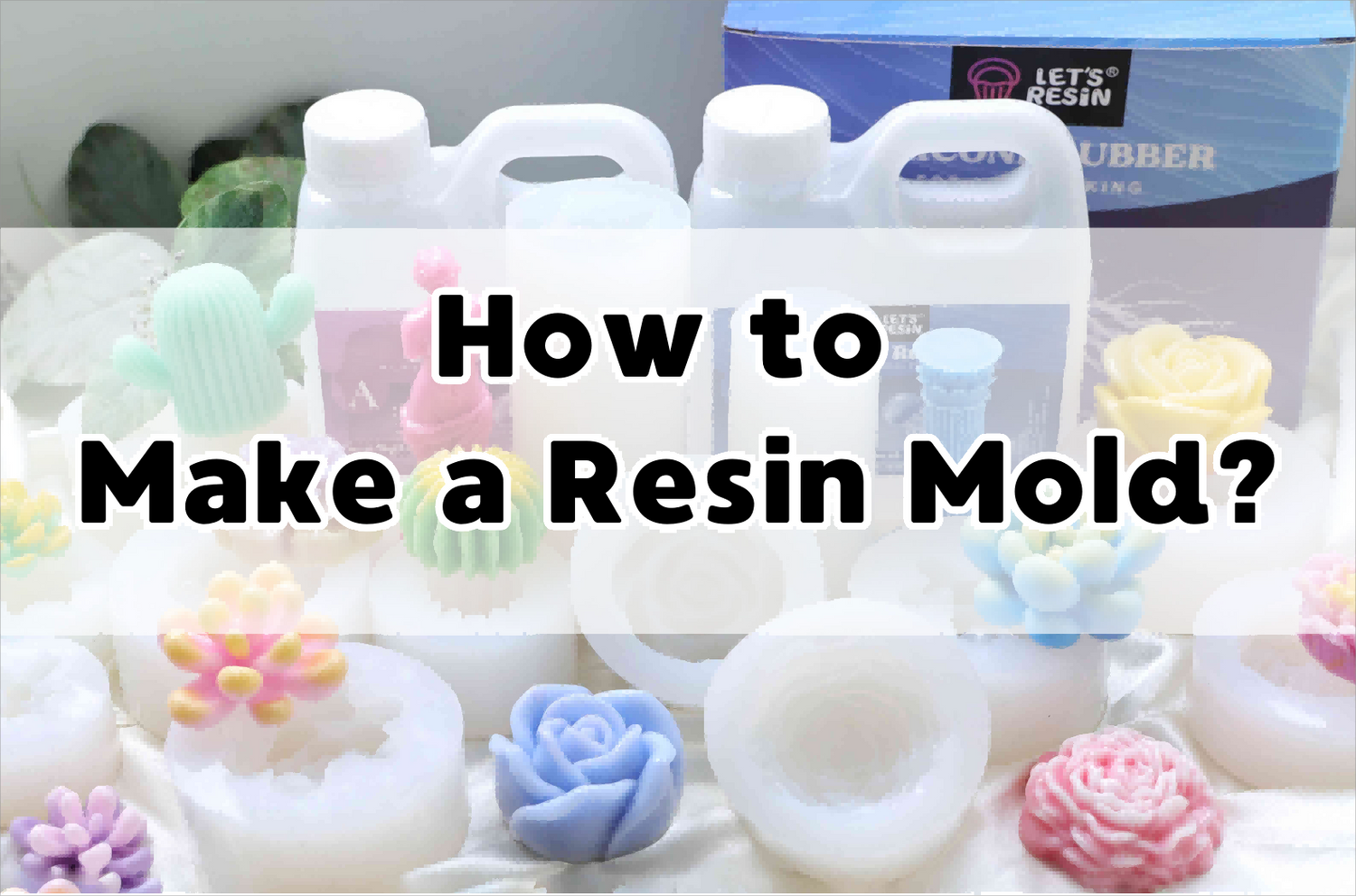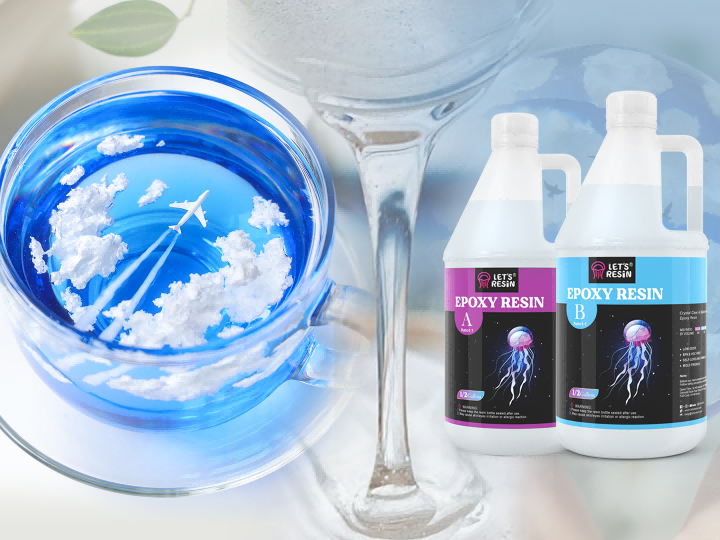When creating resin art, it's almost inevitable that resin will get on your hands or clothes. Resin is a fluid material and can be difficult to control, much like when painting—only at the end do we often realize our clothes and hands are covered in paint. If resin accidentally gets on your skin, it's important to remove it immediately to avoid potential skin irritation. Due to the sticky nature of epoxy resin, cleaning it off skin and clothes can be quite challenging and uncomfortable.
How to Protect Yourself from Direct Contact with Resin
Suggested PPE (Personal Protective Equipment):
-
- Nitrile Gloves
- Waterproof Apron
- Long-Sleeve Protective Clothing
- Waterproof PVC Sheets
1. Nitrile Gloves
We recommend using nitrile gloves because they offer excellent water resistance and durability. We recommend using nitrile gloves as they offer excellent water resistance and durability. Nitrile gloves are strong and highly chemical-resistant, protecting your hands from the harmful effects of epoxy resin and less likely to cause allergic reactions. It's advisable to replace gloves immediately if they become dirty or damaged to prevent resin from seeping through and getting on your skin.
2. Waterproof Apron or Long-Sleeve Protective Clothing
Consider wearing a thick, long-sleeve shirt you don't mind discarding or a waterproof apron. During the resin working process, accidental splashes are hard to avoid. It’s well-known that removing resin from your favorite clothes is challenging, so taking precautions beforehand is essential.
3. Waterproof PVC Sheets
To make cleanup easier, we recommend using waterproof PVC sheets on your workspace surface while creating resin art. Even regular household plastic bags can serve this purpose. Since epoxy resin is a liquid material, it's challenging to avoid splashes during the process. If resin drips onto the work surface, it can take considerable time to clean up. By protecting the workspace in advance, you can reduce the likelihood of dealing with unexpected messes, allowing you to fully enjoy the creative process.
How to Remove Resin from Skin Easily
While creating resin art, it's almost inevitable that resin will get on your skin, especially if gloves break or you accidentally spill materials. Resin is waterproof and doesn't dissolve in regular water, making it difficult to remove with standard cleaning products like hand soap, body wash, or water. This often leaves a sticky, uncomfortable residue on your skin. It's crucial not to use solvents to clean resin off your skin, as they can dissolve the resin and increase absorption into your skin. Instead, exfoliating products can effectively remove resin traces, making this the safest and most effective method. Here are some effective methods to try and a few to avoid, to help you clean resin stains without any unnecessary setbacks.
Recommended Materials:
-
- Exfoliating Scrub
- Baking Soda and Dish Soap
- Hand Cleaner (Fast Orange, Gojo Natural Orange)
- Warm Soapy Water, and a Cloth
Not Recommended Materials
-
- Regular Hand Soap
- Vinegar and Vinegar-Based Cleaners
- Low-Concentration Alcohol
- Nail Polish Remover
Recommended Methods
1. Exfoliating Scrub
Exfoliating scrubs are effective at removing resin from your skin because they contain abrasive particles that help to lift and eliminate resin traces. Simply apply a small amount of scrub to the affected area, gently massage it in, and rinse thoroughly with warm water. For enhanced cleaning, you can mix the scrub with some hand soap. Be sure not to scrub too vigorously to avoid irritating or damaging your skin.
2. Baking Soda and Dish Soap
I stumbled upon this effective method by accident. While dish soap alone can clean grease, it doesn't break down resin. However, by mixing dish soap and baking soda in a 1:1 ratio to form a creamy paste, you can effectively remove resin from your skin. Apply the mixture to the resin-stained area and gently rub it in. This convenient and practical household method makes it easy to promptly clean resin stains.
3. Hand Cleaner (Fast Orange, Gojo Natural Orange)
Hand cleaners, such as Fast Orange and Gojo Natural Orange, are heavy-duty, citrus-based cleaners that don't contain solvents. Unlike regular antibacterial hand soaps, these cleaners are specifically formulated to break down and remove substances like epoxy resin, tar, adhesives, asphalt, tile cement, paint, and ink. Their powerful cleaning capabilities make them particularly effective for tackling tough resin stains.
4. Warm Soapy Water, and a Cloth
For small areas of uncured, runny resin, you can use warm soapy water to clean it off. Simply use a cloth to wipe the affected area with the soapy water, and the resin should come off easily. However, if the resin has covered a large area or has started to cure, this method becomes less effective and may leave a sticky residue. In such cases, it is better to use other recommended methods above for a thorough cleaning.
Not Recommended Methods
1. Regular Hand Soap
Regular hand soap is only effective at removing common stains and is unable to thoroughly break down resin. After cleaning, it may leave a sticky residue on your skin, causing discomfort. Therefore, it is not recommended for removing resin stains.
2. Vinegar and Vinegar-Based Cleaners
Using vinegar or vinegar-based cleaners, or any other non-skin-specific solvents, is highly unsafe for the skin. These solvents can be absorbed by the skin and may react chemically with the resin, increasing the risk of absorption by the skin. Therefore, it is not recommended to use them. Additionally, while vinegar may partially clean resin, it is not fully effective and can produce a strong unpleasant odor.
3. Low-Concentration Alcohol
High-concentration alcohol can effectively clean resin stains, especially those on tabletops or smooth surfaces. However, it is not fully effective at cleaning resin off the skin because the skin's surface contains many tiny pores, making it difficult to clean thoroughly. After cleaning, a sticky residue may remain on the skin, particularly when using low-concentration alcohol. Therefore, it is not recommended for this purpose.
4. Nail Polish Remover
Nail polish remover is commonly used to remove nail polish and contains ingredients that can break down resin. It may be effective for cleaning resin off tabletops or smooth surfaces. However, it is not suitable for direct contact with the skin because it can be irritating, especially for sensitive skin, and may cause redness or inflammation. I recommend using nail polish remover to clean resin off surfaces while wearing nitrile gloves to avoid direct skin contact and prevent skin irritation.
Conclusion
Cleaning epoxy resin stains is not a difficult task, but for those new to epoxy resin art, it's essential to be cautious, especially with clothing. Once resin stains clothing, it cannot be repaired. So it's essential to prioritize proper protection from the beginning, right? In the next section, I'll share how to clean resin stains on the projects.








1 comment
I’ve found puppy pee pads are great for covering work surfaces. If resin spills it doesn’t go thru to surface you’re working on.